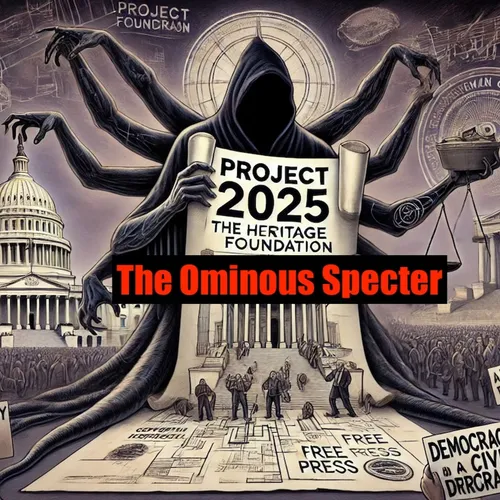Transforming the Federal Government: Project 2025's Radical Restructuring Agenda
- Author
- Quiet.Please
- Published
- Sun 16 Feb 2025
- Episode Link
- https://www.spreaker.com/episode/transforming-the-federal-government-project-2025-s-radical-restructuring-agenda--64408731
As I delve into the intricacies of Project 2025, a sprawling initiative crafted by former Trump administration officials and the conservative think tank, The Heritage Foundation, it becomes clear that this is more than just a policy blueprint – it's a vision for a radical restructuring of the U.S. federal government.
Project 2025 is encapsulated in a 900-page manual titled "Mandate For Leadership," which outlines a comprehensive plan to reorganize every federal agency to align with conservative principles. This project is not just about policy tweaks; it's about transforming the very fabric of American governance. The Heritage Foundation's President, Kevin Roberts, has described their role as "institutionalizing Trumpism," a notion that underscores the deep connections between this project and the former Trump administration[1][4][5].
One of the most striking aspects of Project 2025 is its ambition to consolidate executive power. The initiative advocates for placing the entire executive branch under direct presidential control, eliminating the independence of agencies like the Department of Justice (DOJ), the Federal Bureau of Investigation (FBI), and the Federal Communications Commission (FCC). This centralization is rooted in a controversial interpretation of the unitary executive theory, which aims to give the president unprecedented control over the government. As Kevin Roberts put it, "all federal employees should answer to the president"[2][3].
The project's impact on federal agencies is far-reaching. For instance, it proposes merging the Bureau of Economic Analysis, the Census Bureau, and the Bureau of Labor Statistics into a single entity, with a mission aligned with conservative principles. It also recommends abolishing the Consumer Financial Protection Bureau and the Federal Trade Commission (FTC), which is responsible for enforcing antitrust laws. The National Labor Relations Board, crucial for protecting employees' rights to organize, would see its role significantly diminished[2].
In the realm of education, Project 2025 envisions a drastic reduction in the federal government's role. It suggests closing the Department of Education and transferring control over education funding and policy to the states. Federal enforcement of civil rights in schools would be curtailed, and programs like the Individuals with Disabilities' Education Act (IDEA) would be administered by the Department of Health and Human Services. The project also advocates for the expiration of Title I of the Elementary and Secondary Education Act of 1965, which provides $18 billion in federal funds for schools in low-income areas. Instead, public funds would be available as school vouchers, even for private or religious schools[2].
The environment is another area where Project 2025's proposals are particularly contentious. The initiative seeks to downsize the Environmental Protection Agency (EPA), close its Office of Environmental Justice and External Civil Rights, and reverse a 2009 EPA finding that carbon dioxide emissions are harmful to human health. This would prevent the federal government from regulating greenhouse gas emissions. The project also supports the expansion of fossil fuel use, including Arctic drilling, and advocates for preventing states from adopting stricter regulations on vehicular emissions. Diana Furchtgott-Roth, Heritage Foundation's energy and climate director, has suggested that the EPA should support the consumption of more natural gas, despite concerns about methane leaks[2].
Project 2025's stance on climate change is starkly at odds with the views of many Republicans, including younger conservatives who acknowledge human activity's role in climate change. Benji Backer, founder of the American Conservation Coalition, has called the project's climate policies "wrongheaded," highlighting a growing consensus among younger Republicans that climate action is...
